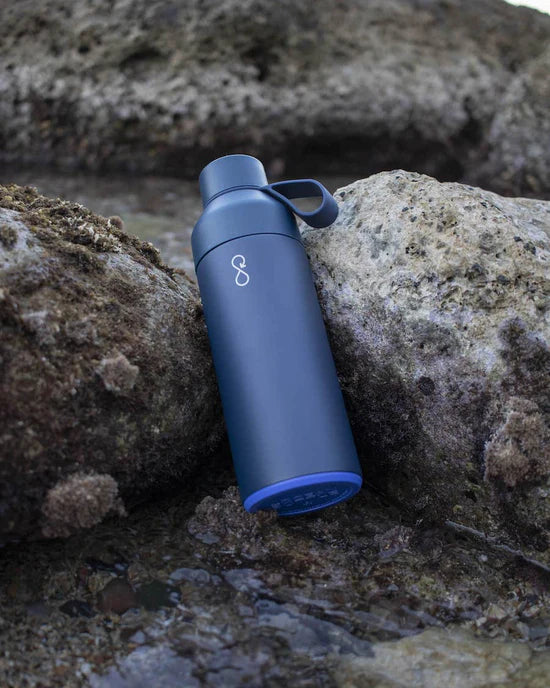It seems like the GAFAs (Google, Apple, Facebook, Amazon) and other behemoths of the world consistently reap in more profits, signalling to the competition that those big capitalist corporate models, focusing on bottom line margins and shareholder value are the strongest paths to success.
But what if you don’t want to make a career always selling more things to more people? I certainly didn’t want to just sell another stainless steel bottle, I wanted to make a real impact when joining Ocean Bottle. It’s clear that many more of us care about the planet and sustainability, if we’re driven by purposeful objectives over profit then do we have to sacrifice this at the behest of a financially viable career?
This piece will show you how impact companies can be just as fast growing and financially viable.
Sustainability values the long term for a good reason
Building an impact driven business, improving the environment, social welfare or economic equality for example, breaks quite sharply with the conventional way of conducting business in the 21st century.
Comparing a reusable bottle company with a cost reduction strategy, to one with an environmental impact mission amounts to comparing bananas to oranges.
The truth is business for good is often associated with lower profitability.
Let’s take a textile dyeing company situated by a river, conscious of its waste water.
It will invest in best in class filtration and evacuation systems, costing more than what the competition would likely spend. While this results in a short term lower margin for our waste conscious dyer, higher quality and more efficient machinery doesn’t need to be replaced as often. Over time, it will likely provide more savings for the company in maintenance and replacements than opting for a cost efficient solution today. The environmental impact, coupled with the longer term financial view compounds the benefit. Additionally, allowing yourself to look at a production chain in a more circular way - rather than the old take make waste, linear system - saves resources, creates new challenging jobs and among other things, cuts waste.
Besides, the manufacturers of this world cannot any longer ignore the impact of production, materials, supply chain and product on the environment. The linear economy of take-make-waste has to end. Instead we have to think about products and materials that are designed to increase use and reuse, replicating the balance of the natural world, where nothing becomes waste and everything has value.
The success of this model is being proven by the Solar Impulse Foundation, which is gathering 1000 companies around the world combining the best in class protection of our environment with profitability.
For profit-impact companies have a marketing and perception issue.
Often they focus on efficiency as a whole and not cost reduction, so they will always seem to be less attractive at first. It takes time to perfect a system, service or product. But optimizing supply chains, production and distribution channels as a whole often proves to be a concrete improvement for the environment and your wallet. A sometimes forgotten added benefit is that spending time building an ever more sustainably efficient product or service, with unique suppliers, and well sourced materials, impedes competition from replicating your model.
Calculating Impact
Companies face another challenge when trying to assess their impact and revenue, they find it difficult to incorporate impact into their existing offering.
What is paramount is to look at impact as an inherent cost of the product or service, not an add on, no matter how big or small it is. By allocating a given percentage or fixed amount of revenue into the costs of production, it allows for added scrutiny of inefficiencies elsewhere in the business. That way, margins and profits remain untouched and look more robust from the get go.
As an impact product will often be more expensive than its traditional counterpart, companies tend to think that consumers will likely choose the latter over the former. However, when consumers see a transparent mission and impact is “baked in” they are often willing to go the extra mile financially to support a business, and cause, they believe in.
Pitching the impact as a part of the product implicates a core reason to choose our product. Ocean Bottle supports livelihoods for people in coastal communities, whilst keeping plastic out of our ocean. For every Ocean Bottle sold we commit to the collection of the equivalent of 1000 plastic bottles. That’s 11.4kg of plastic put to better use. Collectors trade plastic for money, healthcare, tuition, tech, and microfinance.
Corporate social responsibility can be just buzz. We prefer radical action and try to give a way for companies to get involved with this mission as part of their own CSR / ISO commitments For example, if a company purchases 1,000 Ocean Bottles for Employees or Clients that company is now part of the ocean saving impact,that company can declare they have funded the collection of ocean bound plastic equivalent in weight to 1,000,000 plastic bottles. They’re also part of a more transparent supply chain and circular system.
What can I do?
Take a long term view when looking at for-profit Impact companies, a slow growth is a profitable growth, brands that are built to last invest in their supply chain and sustainable efficiencies.
And if you’re asking what if my company doesn’t know how to become more impactful? Well, no step is too small to make an impact for your company. Simple things like taking advantage of natural light as much as possible in your office, sourcing more sustainable office supplies, bringing your own food containers, opting for reusable bottles, engaging with your HR department about diversity hiring, offsetting all company activity and encouraging company funds to be spent supporting Impact Companies.
Impact revolves around curiosity, dissecting processes, asking questions, holding people and corporations accountable.
Written by Emilien Henrotte




